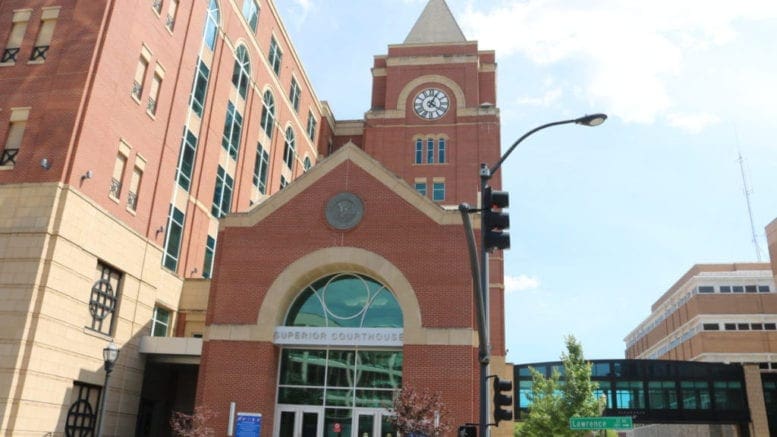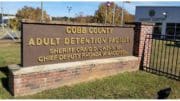On September 16 Cobb County District Attorney Joyette Holmes opened a new chapter in the ongoing investigations of Mr. Kevil Wingo’s death at the Cobb County Adult Detention Center.
In a written statement published on social media, Holmes asked the U.S. Attorney of the Northern District of Georgia to “conduct an independent investigation of the recent inmate deaths.”
Reactions to the announcement varied. On the one hand, some activists in the Cobb community interpret the DA’s appeal to federal authorities as a “welcome move to take action – better late than never – and both a direct and indirect result of the community pressure,” said Richard Pellegrino, field director of the Cobb chapter of the Southern Christian Leadership Conference.
“We wanted an outside party to investigate” said Pax Riddle from the Cobb Coalition for Public Safety.
Criminal justice reformers hope the Wingo case brings attention to a broad set of problems at the detention center: lack of citizen oversight over the Sheriff’s Office, poor transparency about inmate deaths, lack of proper food and water, policies of collective punishment, and little accommodation for veterans and people suffering from mental health issues.
On the other hand, the Wingo family’s lawyer Timothy Gardner expressed that the decision “doesn’t sit as well with me” because “I didn’t understand why she grouped the criminal activity against Mr. Wingo with anyone who may have died at the Cobb County Detention Center.”
Without a timeline and more details, the announcement amounts to an “empty request for a massive, broad investigation without any specific direction” according to Mr. Gardner.
After more reflection, other activists expressed similar concerns.
Sally Riddle, an active member of the Cobb Coalition of Public Safety, told me that Holmes “has actually made things harder by referring the case to the federal level. They are more limited to murder or civil rights violations. And there has to be intent.”
What the DA’s announcement means for Kevil Wingo and his family remains unclear.
Background
Police arrested Mr. Wingo for suspected drug possession in September 2019.
While awaiting trial at the Detention Center, Wingo suffered a ruptured ulcer.
Videos released online in August 2020 show Wingo vomiting, clutching his abdomen, collapsing multiple times, and begging Wellstar infirmary staff to take him to the hospital.
Charge nurses declined to assist him and later moved Mr. Wingo to a padded isolation cell, claiming he was “pretending,” “drug-seeking,” and “just disruptive.”
Testimony from fellow inmates and some nurse staff contradict the notion that Wingo was simply experiencing the symptoms of withdrawal or drug de-tox.
Videos in the isolation cell show Wingo stripped naked, covered with an anti-suicide smock and left on the floor.
According to the Medical Examiner Dr. Abraham Philip’s report, Wingo died shortly thereafter. Police deputies responsible for checking the cells every 15 minutes appear in the video to make only cursory inspections and discovered the body more than an hour later.
The Cobb Sheriff’s Office concealed the details of the death until it concluded an internal investigation this past June. Internal investigations in February and June absolved all parties of criminal negligence.
Sheriff Neil Warren defended his staff in the press, writing in an email reported by 11Alive News “The dedicated men and women of the Cobb Sheriff’s Office work in one of the most difficult environments imaginable but are always attentive to inmates who are in need of medical care.”
The Wingo family submitted pending complaints to the Georgia Board of Nursing against two nurses, Annaleen Visser and Yvette Burton. After videos appeared last August, media scrutiny and activist pressure increased markedly.
11 Alive News circulated the footage and interview recordings from the Sheriff’s Office investigation.
The Cobb Coalition for Public Safety, Cobb Smart Justice Coalition, Cobb SCLC, and the Wingo family’s lawyer Timothy Gardner held two press conferences.
Joined by the Cobb NAACP, ACLU of Georgia, and Georgia Representative David Wilkerson (D – Powder Springs), activists called for an independent investigation by an outside party.
“It is absolutely unfathomable that these individuals have not been charged with crimes” said Mr. Gardner. “It is equally unfathomable that all of them still work in this facility and are receiving tax-payer salaries. That has to stop. Sheriff Neil Warren can make the decision today to make sure every single person involved in Kevil Wingo’s death is terminated immediately.”
DA Holmes initially hesitated to open an investigation, citing a COVID-19 judicial emergency imposed by the Georgia Supreme Court, which prevents grand juries from meeting.
“Upon receiving an updated order from the Georgia Supreme Court that allows us to resume these specific functions, grand jurors will again perform the jail inspection,” wrote DA Holmes.
Later, Holmes reversed course, appealing to the US Attorney to investigate not just Mr. Wingo’s death, but “the recent inmate deaths” at the facility.
When the Courier asked why the DA changed her mind and what precluded her from investigating the allegations herself, Holmes’ office declined to comment.
Reactions
Some observers considered Holmes’ call too little, too late. “I’m glad that she finally did it, but it should have been done within two weeks after Mr. Wingo died” said Flynn Broady, who is running against Holmes for District Attorney this November. “If you look at the recent death they had out in Gwinnett County, within a week they had the GBI come out and investigate. That’s how you take charge of a situation.”
Referring to Holmes’s initial decision to wait to impanel a grand jury, Broady said, “That was an excuse for not doing her job.”
Others found DA Holmes’s decision timely and appropriate.
“I think it was a good thing to do. It’s always good to have an outside agency look at it with an objective set of eyes” said Georgia Representative David Wilkerson. When asked about the timing of the announcement, he replied “After reviewing the files, the DA decided to move forward. No one wants to see it drag on; at the same time no one wants to see it rushed.”
Asked why Holmes’ reversed course, activists attributed her decision to media scrutiny and campaigns of public pressure, such as the 11 Alive investigation, letters to the editor, and the two press conferences.
“The public voiced their opinion and thought that it should be looked at,” said Rep. Wilkerson, “so I think the combination of the public asking for it and her reviewing it resulted in DA Holmes doing it.”
Richard Pellegrino from the Cobb SCLC agreed, ascribing DA Holmes’ decision to “community pressure exerted by our organizations, including the Cobb Smart Justice Coalition, Cobb Public Safety Coalition, SCLC and NAACP, among others. We have been meeting with DA Holmes and will continue to do so regarding this and other cases.”
Others were more blunt. “Without that pressure, DA Holmes would not have done anything. She’s a Republican facing an election and the Sheriff is a Republican. Common sense will say that’s not something she would pursue” said Pax Riddle, a member of the Cobb SCLC and Cobb Coalition of Public Safety Working Group. The Wingo family’s lawyer, Mr. Timothy Gardner told me “The public pressure forced her to do something. I don’t think she ever had a real plan to address this in a way that fits into this political season, so I think there was a lot of scrambling with respect to her comments.”
The District Attorney declined to comment on why she recused herself from the investigation.
Possibility of Political Conflict of Interests
DA Holmes’ apparent recusal indicates a larger issue, according to some. Are partisan loyalties impeding a thorough investigation into Kevil Wingo’s death?
“It amazes me that the DA in this case refuses to handle state crimes against members of her own county, yet she’ll go prosecute state crimes against other individuals hundreds of miles away,” said Gardner, alluding to DA Holmes’ role as lead prosecutor in the Ahmaud Arbery case.
Three white men shot Arbery to death earlier this year while he was jogging in a south Georgia neighborhood.
“My thought is [Holmes] didn’t want her name as a Republican district attorney to be associated with investigating a Republican sheriff,” said Mr. Broady.
Sally Riddle stressed that “we can’t know for sure why she recused herself.”
Resort to the GBI is also politically thorny. According to Pax Riddle, “the GBI has tended to side with law enforcement.”
Vic Reynolds, the head of GBI, “has enjoyed a close relationship with Sheriff Warren for years” according to Sally Riddle, and he preceded Joyette Holmes as District Attorney of Cobb County.
All three are, or have been, candidates of the Republican party. For Riddle, the alternative is clear: “What she could have done, like was done in the Arbery case, was recuse herself and request a DA from another county be assigned to pursue the case.”
DA Holmes herself, had adopted such a position in prosecuting Arbery’s killers.
Justice for Wingo and Criminal Justice Reform
On the prospects of obtaining justice for Mr. Wingo, Mr. Gardner was unequivocal: Appealing to the US attorney is “another hurdle this family has had to overcome in order to get justice for the death of their father. She’s passing the buck.”
Because the U.S. Attorney investigates federal crimes, Gardner explained “they don’t investigate murder or manslaughter per se; it’s not under their jurisdiction. They investigate crimes committed under the color of law. To prove that, you have to show willful behavior.”
The narrower focus and higher evidence standard could prove an obstacle to convicting the nurses and police deputies of criminal neglect. Gardner also added that grouping Mr. Wingo’s death with the other deaths at the detention facility under a broad, vague purview also dilutes the strength of Mr. Wingo’s case, because the latter is “the case in which we know specifically there was criminal conduct.”
For some, broadening the scope of the investigation is a good thing because it increases scrutiny into the practices of the jail. Since Sheriff Neil Warren took office, local activists have documented over ten deaths, an “unusually high” number according Pax Riddle, although he admitted comparative data to other facilities in the carceral system is scarce.
“Remember, people in the detention center haven’t been convicted of a crime. They were arrested and are awaiting trial, but because the court system is backed up, that sometimes takes many months,” said Riddle. “They’re treated like felons, even though most people face misdemeanors. And those facing felonies are mostly there for drug possession.”
In this respect, Democrat candidate for Cobb DA Flynn Broady identified the pattern of neglect beyond the vicissitudes of current officials: “It’s not just her. It’s every Republican sheriff and district attorney we’ve had over the last sixteen years that’s failed to do their job to make sure that when we put somebody in jail, that they’re going to be taken care of and they’re going to be safe.”
Alleged lack of transparency has also sparked criticism. “The Sheriff is content to rely on Medical Examiner’s report. But often the conclusion ‘died of natural causes’ belies the fact that the center exacerbated the issue” says Pax Riddle. Several additional detainees have died in custody since December 2018: Reginald Wilson, Jessie Myles, Bradley Emory, and William Kocour, among others.
Wingo’s high-profile case has increased scrutiny into these other deaths at the center. Last month, 11 Alive News filed a lawsuit against the Cobb County Sheriff Neil Warren, alleging his department violated the Georgia Open Records Act in an attempt to conceal documents related to inmate deaths. Meanwhile, the Wingo family has filed a lawsuit against Wellstar Health System, six nurses, and three police deputies. The lawsuit seeks financial compensation and the defendants held accountable.
Along with Cobb and Austell civil rights groups, the ACLU of Georgia has planned a town hall in the Marietta Square to honor those who have died at the Detention Center, Wednesday October 7 6:30 – 8:30 p.m.



